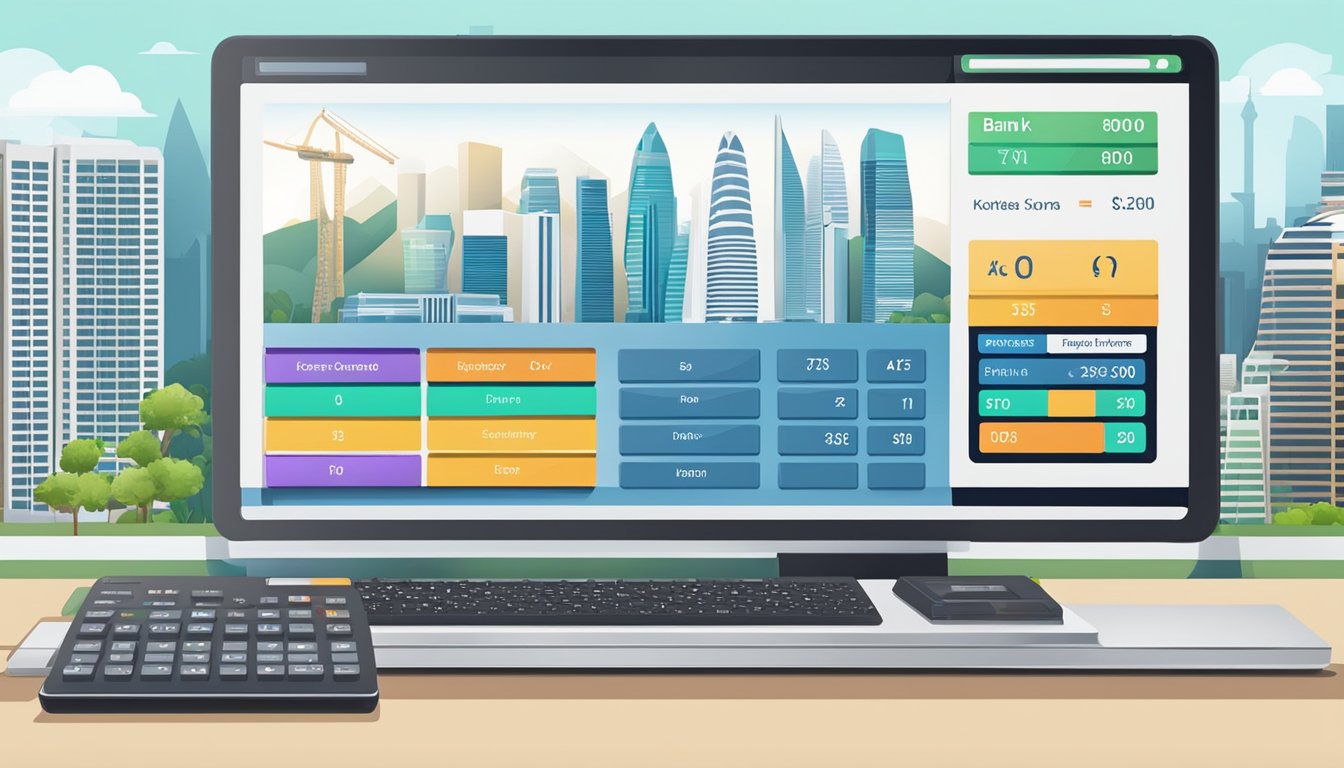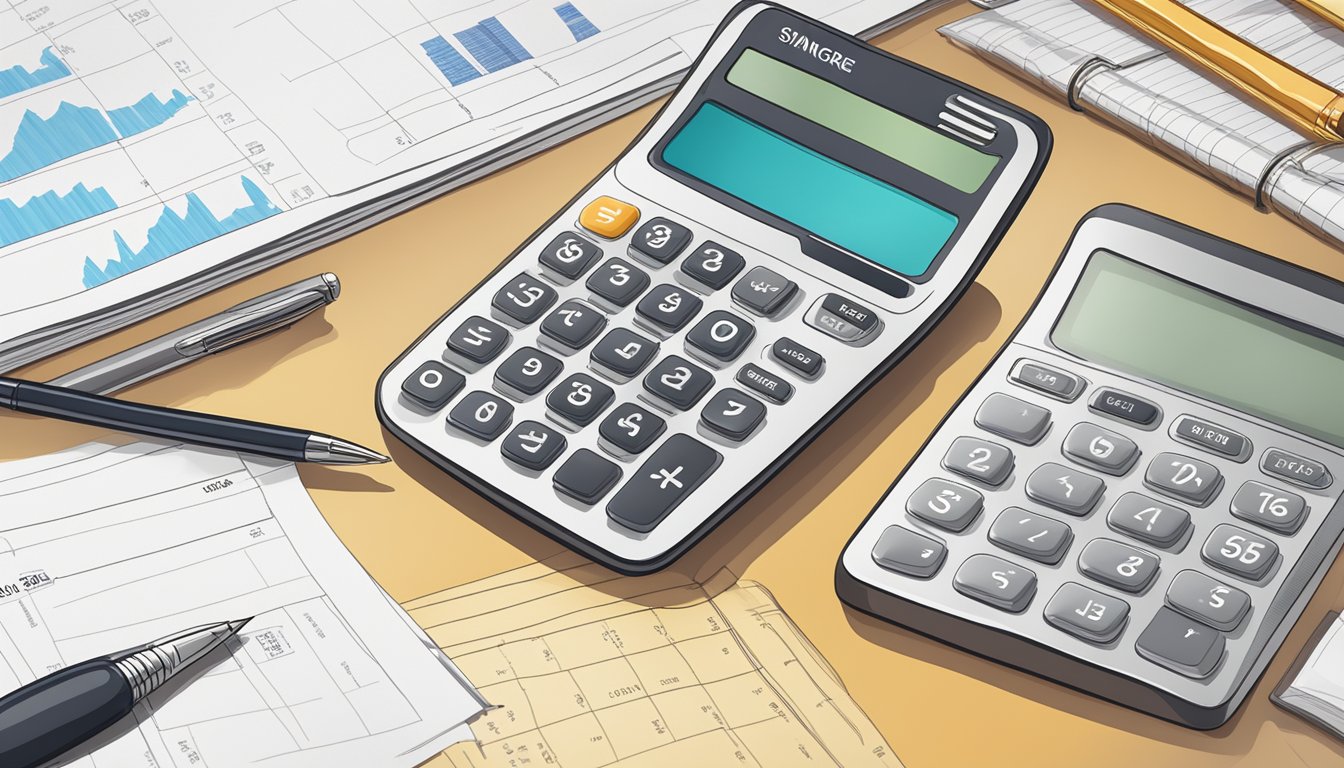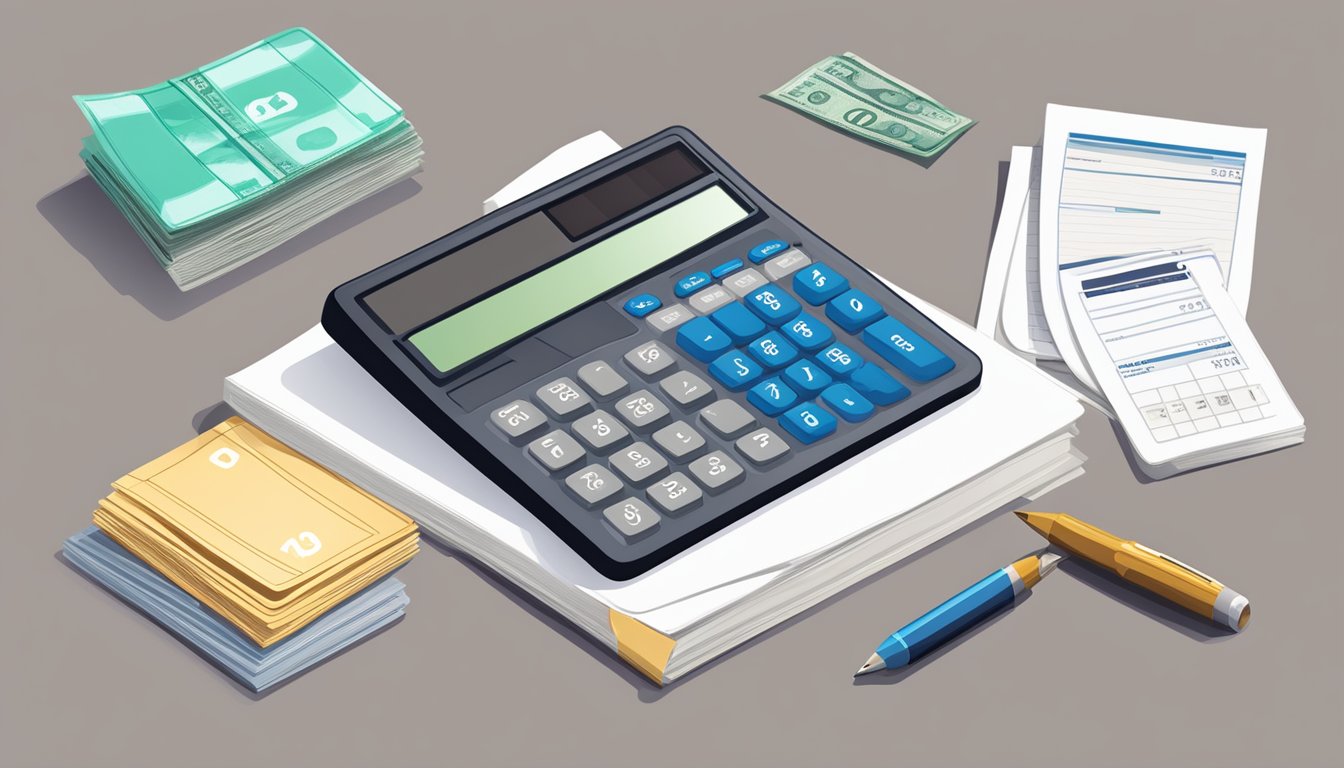Bank loan calculators are an essential tool for anyone looking to purchase a property in Singapore. They help you determine how much you can borrow, your monthly repayments, and the total interest payable over the life of the loan. Using a bank loan calculator can help you make informed decisions about your property financing options and ensure that you don’t overstretch your finances.

Understanding bank loan calculators can be a bit daunting, especially if you’re new to the world of property financing. However, with a little bit of research and some basic knowledge of the lending process, you can quickly get up to speed. Most bank loan calculators in Singapore are easy to use and provide you with an estimate of your loan repayments in just a few clicks.
To use a bank loan calculator, you’ll need to input some basic information about your financial situation, such as your income, expenses, and any other debts you may have. You’ll also need to provide details about the property you’re looking to purchase, such as its value and the amount of the down payment you’re able to make. Once you’ve entered all the necessary information, the calculator will provide you with an estimate of your monthly repayments, the total interest payable over the life of the loan, and other important details.
Key Takeaways
- Bank loan calculators are essential tools for anyone looking to purchase a property in Singapore.
- Understanding how to use a bank loan calculator can help you make informed decisions about your property financing options.
- By using a bank loan calculator, you can quickly get an estimate of your monthly repayments and the total interest payable over the life of the loan.
Understanding Bank Loan Calculators

When you’re thinking about applying for a bank loan, it’s important to understand how interest rates, loan tenure, loan amount, and purchase price will affect your monthly payments. Luckily, bank loan calculators can help you figure out all these numbers and make an informed decision.
Interest Rates and Their Impact
Interest rates are an important factor to consider when taking out a bank loan. The interest rate is the percentage of the loan amount that you’ll pay in addition to the principal amount. This means that the higher the interest rate, the more you’ll end up paying in the long run.
Bank loan calculators can help you see how different interest rates will affect your monthly payments. For example, if you’re considering a loan of $50,000 with an interest rate of 5%, your monthly payments will be different than if you had an interest rate of 10%. Use the calculator to see how much of a difference even a small change in interest rate can make.
Calculating Your Loan Tenure
The loan tenure is the amount of time you have to repay your loan. This is an important factor to consider because it affects your monthly payments. The longer the loan tenure, the lower your monthly payments will be, but the more you’ll end up paying in interest in the long run.
Bank loan calculators can help you see how different loan tenures will affect your monthly payments. For example, if you’re considering a loan of $50,000 with a loan tenure of 5 years, your monthly payments will be different than if you had a loan tenure of 10 years. Use the calculator to see how much of a difference even a small change in loan tenure can make.
Assessing Loan Amount and Purchase Price
The loan amount is the total amount of money you’re borrowing from the bank. The purchase price is the total cost of the item you’re buying, such as a car or a house. It’s important to consider both of these factors when taking out a bank loan.
Bank loan calculators can help you see how different loan amounts and purchase prices will affect your monthly payments. For example, if you’re considering buying a car for $30,000 and you want to take out a loan for $20,000, your monthly payments will be different than if you had taken out a loan for the full $30,000. Use the calculator to see how much of a difference even a small change in loan amount or purchase price can make.
In conclusion, bank loan calculators are a great tool to help you understand how different factors will affect your monthly payments. Use them to make an informed decision when taking out a bank loan.
Eligibility and Requirements

When it comes to applying for a bank loan in Singapore, there are certain eligibility criteria and requirements that you need to meet. In this section, we will discuss the various factors that determine your eligibility for a bank loan and the requirements that you need to fulfil to get approved.
Age and Income Considerations
One of the most important factors that determine your eligibility for a bank loan in Singapore is your age and income. Most banks in Singapore require borrowers to be at least 21 years old and have a minimum gross monthly income of $1,500. However, some banks may have higher income requirements depending on the type of loan you are applying for.
Total Debt Servicing Ratio (TDSR) Guidelines
The Total Debt Servicing Ratio (TDSR) is a framework that was introduced by the Monetary Authority of Singapore (MAS) to ensure that borrowers do not overextend themselves financially. The TDSR is a measure of the percentage of your gross monthly income that goes towards servicing all your debt obligations, including your mortgage, car loan, credit card debt, and other loans.
According to the TDSR guidelines, your total debt obligations should not exceed 60% of your gross monthly income. This means that if your gross monthly income is $5,000, your total debt obligations should not exceed $3,000 per month.
Maximum Loan Amount and Tenure
The maximum loan amount and tenure that you can get approved for will depend on various factors, including your income, credit score, and the type of loan you are applying for. Most banks in Singapore have a maximum loan tenure of 35 years for private properties and 25 years for HDB flats.
The maximum loan amount that you can get approved for will depend on your TDSR and your income. Most banks in Singapore will only approve a loan amount that will ensure that your TDSR remains below 60%.
In conclusion, meeting the eligibility criteria and requirements for a bank loan in Singapore can be a daunting task. However, by understanding the various factors that determine your eligibility and the requirements that you need to fulfil, you can increase your chances of getting approved for a bank loan.
Property Financing in Singapore

If you are looking to purchase a property in Singapore, you will likely need to take out a loan to do so. Fortunately, there are many banks and financial institutions in Singapore that offer property financing options.
Financing HDB Flats
If you are interested in purchasing a Housing and Development Board (HDB) flat, you can apply for an HDB loan or a bank loan. HDB loans are only available for the purchase of new or resale HDB flats, while bank loans can be used to finance both HDB flats and private properties.
One advantage of an HDB loan is that the interest rate is fixed, which means that your monthly repayment amount will remain the same throughout the loan tenure. On the other hand, bank loans offer more flexibility in terms of interest rates and loan tenures.
To determine how much you can borrow for an HDB flat, you can use a bank loan calculator Singapore. These calculators take into account factors such as your income, loan tenure, and interest rate to give you an estimate of your monthly repayment amount.
Buying Private Properties
If you are interested in purchasing a private property, you will need to apply for a bank loan. Private properties include condominiums, apartments, and landed properties.
When applying for a bank loan, you will need to consider factors such as the loan amount, interest rate, and loan tenure. You can use a bank loan calculator Singapore to help you determine how much you can borrow and what your monthly repayment amount will be.
In addition to the loan amount, you will also need to factor in other costs such as buyer stamp duty and legal fees. Buyer stamp duty is a tax that is payable on the purchase of a property in Singapore. The amount of buyer stamp duty that you will need to pay depends on the purchase price of the property.
Overall, purchasing a property in Singapore can be a complex process, but with the help of a bank loan calculator Singapore and the right financing options, you can make your dream of owning a home a reality.
Additional Costs and Fees

When you take out a bank loan in Singapore, there are additional costs and fees that you need to be aware of. These costs can add up quickly and significantly increase the amount you need to repay.
Processing Fees and Other Charges
Most banks in Singapore charge a processing fee when you apply for a loan. This fee is usually a percentage of the loan amount and can range from 1% to 3%. For example, if you take out a loan of $10,000 with a processing fee of 2%, you’ll need to pay an additional $200 on top of the loan amount.
In addition to processing fees, some banks may also charge other fees such as late payment fees, early repayment fees, or cancellation fees. It’s important to read the loan agreement carefully to understand all the charges and fees associated with the loan.
Understanding Buyer Stamp Duty
If you’re taking out a loan to buy a property in Singapore, you’ll also need to pay Buyer Stamp Duty (BSD). BSD is a tax on the purchase price or market value of the property, whichever is higher. The amount of BSD you need to pay depends on the purchase price or market value of the property.
For example, if you’re buying a property for $1 million, you’ll need to pay $24,600 in BSD. This cost can add up quickly, so it’s important to factor it into your budget when you’re planning to buy a property.
When taking out a loan, it’s important to consider all the additional costs and fees associated with the loan. This will help you budget properly and ensure that you can afford to repay the loan without putting yourself in financial difficulty.
Optimising Your Loan

When it comes to taking out a bank loan in Singapore, it’s important to make sure you’re getting the best deal possible. One way to do this is by optimising your loan to ensure you’re getting the lowest possible interest rate and monthly installments.
The Benefits of Refinancing
If you already have a loan, one way to optimise it is by refinancing. Refinancing means taking out a new loan to pay off your existing loan. This can be beneficial if you can get a lower interest rate on the new loan, as it can result in significant interest savings over the life of the loan.
When refinancing, it’s important to consider the effective interest rate (EIR) of the new loan. The EIR takes into account all the fees and charges associated with the loan, and is a more accurate representation of the true cost of borrowing. Make sure to compare the EIR of the new loan with the EIR of your existing loan to ensure you’re getting a better deal.
How to Lower Monthly Installments
Another way to optimise your loan is by lowering your monthly installments. This can be done by extending the loan tenure, which will result in lower monthly payments. However, keep in mind that extending the loan tenure will also result in paying more interest over the life of the loan.
If you’re looking to lower your monthly installments without extending the loan tenure, consider looking for a home loan package with a lower interest rate. This can result in lower monthly payments without extending the loan tenure or paying more interest.
In summary, optimising your loan can help you save money in the long run. Consider refinancing to get a lower interest rate and compare the EIR of the new loan with your existing loan. If you’re looking to lower your monthly installments, consider extending the loan tenure or finding a home loan package with a lower interest rate. By taking these steps, you can ensure you’re getting the best deal possible on your bank loan in Singapore.
Analysing Loan Calculator Results

Using a loan calculator can help you determine how much you can afford to borrow and what your monthly repayments will be. The results from a loan calculator are indicative and can vary depending on the interest rate, loan amount, and loan tenure.
When analysing loan calculator results, it is important to consider the following factors:
-
Results: The loan calculator will provide you with an estimate of your monthly repayments and total interest payable. This will give you an idea of how much you can afford to borrow and whether the loan is suitable for your needs.
-
Indicative: The results from a loan calculator are indicative and may not be the exact repayment amount. The actual repayment amount may differ depending on the interest rate and other fees and charges.
-
Monthly Repayment: The monthly repayment is the amount you will need to pay each month to repay the loan. It is important to ensure that you can afford the monthly repayment amount before taking out a loan.
It is important to note that the results from a loan calculator are for illustrative purposes only and should not be considered as a guarantee. The actual loan amount and repayment amount may differ depending on the lender’s terms and conditions.
In conclusion, using a loan calculator can be a useful tool when considering taking out a loan. It can help you determine how much you can afford to borrow and what your monthly repayments will be. However, it is important to remember that the results are indicative and may not be the exact repayment amount.
Frequently Asked Questions
What’s the maximum amount you could borrow for a mortgage in Singapore?
If you’re looking to purchase a property in Singapore, you may be wondering how much you can borrow. The amount you can borrow will depend on various factors, including your income, credit score, and the value of the property. However, you can use a TDSR calculator to give you an idea of the maximum amount you can borrow.
How do you work out the interest on your personal loan with a Singaporean bank?
To work out the interest on your personal loan with a Singaporean bank, you can use a loan calculator. You’ll need to enter the loan amount, the interest rate, and the loan term. The calculator will then show you the total interest payable and the monthly repayment amount.
Can you show me how to use a DBS home loan calculator with glee?
Yes, using a DBS home loan calculator is easy and straightforward. First, enter the loan amount, the loan tenure, and the interest rate. The calculator will then show you the monthly repayment amount and the total interest payable. You can also use the calculator to compare different loan packages and find the one that best suits your needs.
What salary do you need to snag a hefty bank loan in Singapore?
The salary you need to snag a hefty bank loan in Singapore will depend on various factors, including the loan amount, your credit score, and the lender’s requirements. However, as a general rule, you’ll need to have a stable income and a good credit score to qualify for a large bank loan.
How exciting is it to calculate monthly repayments for an HDB loan?
Calculating monthly repayments for an HDB loan can be exciting, especially when you’re about to purchase your dream home. You can use a loan calculator to determine the monthly repayment amount, the total interest payable, and the loan tenure. With this information, you can make an informed decision about your home loan.
What are the exhilarating steps to determine the cost of a £20,000 loan?
To determine the cost of a £20,000 loan, you’ll need to consider the interest rate, the loan term, and any fees or charges. You can use a loan calculator to get an estimate of the total cost, including the interest payable and any fees. Once you have this information, you can decide whether the loan is affordable and suitable for your needs.




